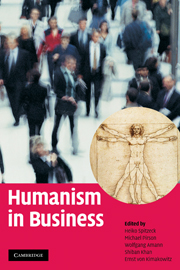Book contents
- Frontmatter
- Contents
- List of figures
- List of tables
- List of editors and contributors
- Acknowledgements
- Humanistic Management Network: paving the way towards a life-serving economy
- Introduction
- Part 1 Philosophic-historical grounding of humanism
- Part 2 Towards an integration of humanism and business on a systems level
- 8 Towards a civilized market economy: economic citizenship rights and responsibilities in service of a humane society
- 9 Development as freedom: individual freedom as a social commitment
- 10 On corporate responsibility for human rights
- 11 The value shift: merging social and financial imperatives
- 12 The ugly side of capitalism: what the young generation needs to combat
- Part 3 Humanistic management
- Part 4 The individual as a change agent for a humane business society
- Index
- References
11 - The value shift: merging social and financial imperatives
Published online by Cambridge University Press: 25 January 2011
- Frontmatter
- Contents
- List of figures
- List of tables
- List of editors and contributors
- Acknowledgements
- Humanistic Management Network: paving the way towards a life-serving economy
- Introduction
- Part 1 Philosophic-historical grounding of humanism
- Part 2 Towards an integration of humanism and business on a systems level
- 8 Towards a civilized market economy: economic citizenship rights and responsibilities in service of a humane society
- 9 Development as freedom: individual freedom as a social commitment
- 10 On corporate responsibility for human rights
- 11 The value shift: merging social and financial imperatives
- 12 The ugly side of capitalism: what the young generation needs to combat
- Part 3 Humanistic management
- Part 4 The individual as a change agent for a humane business society
- Index
- References
Summary
The turn to values
Business has changed dramatically in the past few decades. Advances in technology, increasing globalization, heightened competition, shifting demographics – these have all been documented and written about extensively. Far less notice has been given to another, more subtle, change – one that is just as remarkable as these more visible developments. What I have in mind is the attention being paid to values in many companies today.
When I began doing research and teaching about business ethics in the early 1980s, skepticism about this subject was pervasive. The whole enterprise, said critics, was misguided and based on a naive view of the business world. Back then, accepted wisdom held that “business ethics” was a contradiction in terms. The most generous view was that business ethics had something to do with corporate philanthropy, a topic that might interest executives after their companies became financially successful. But even then, it was only a frill – an indulgence for the wealthy or eccentric.
Today, attitudes are different. Though far from universally embraced – witness the scandals of 2001 and 2002 – ethics is increasingly viewed as an important corporate concern. What is our purpose? What do we believe in? What principles should guide our behavior? What do we owe one another and the people we deal with – our employees, our customers, our investors, our communities? Such questions of ethics are being taken seriously in many companies around the world.
- Type
- Chapter
- Information
- Humanism in Business , pp. 204 - 217Publisher: Cambridge University PressPrint publication year: 2009
References
- 2
- Cited by

